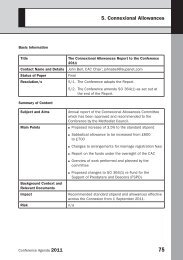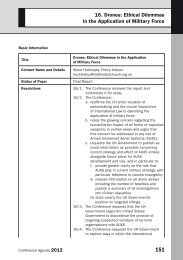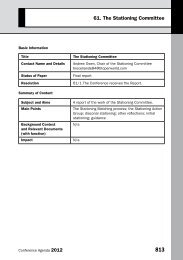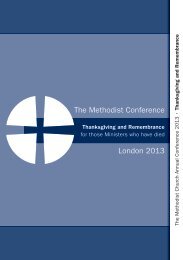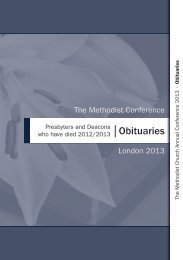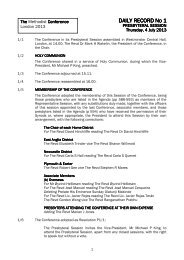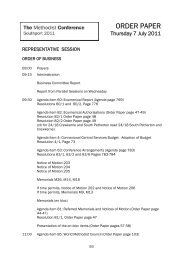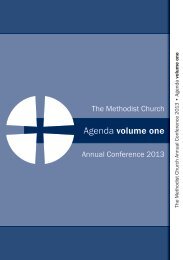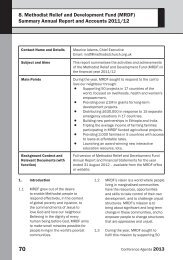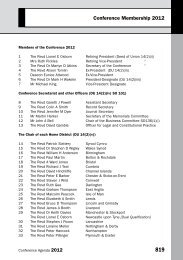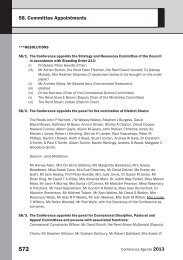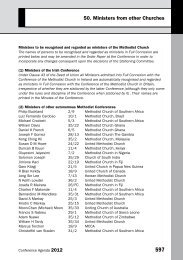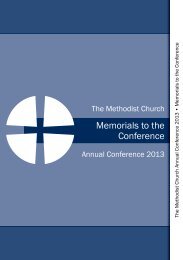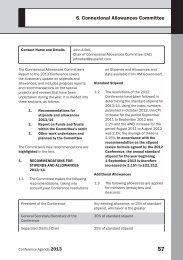Agenda Volume 3 - Methodist Conference
Agenda Volume 3 - Methodist Conference
Agenda Volume 3 - Methodist Conference
You also want an ePaper? Increase the reach of your titles
YUMPU automatically turns print PDFs into web optimized ePapers that Google loves.
57. The Fruitful Field Project<br />
113.22 We acknowledged the advantages of locating the hub within a new and<br />
customised space, designed and properly configured to meet today’s learning<br />
needs. We acknowledged that energy and resources might be released by<br />
the creation of the hub on a new site. We considered issues of geographical<br />
location and accessibility. However we did not move to make a recommendation<br />
at this stage, as it was our preference to focus in the first instance on the<br />
principles and ethos of the hub and on the needs which it will meet, before<br />
moving on to consider the secondary issues of location and configuration.<br />
What else did we consider?<br />
113.23 We considered the radical option of not maintaining any connexional hub or<br />
learning institution, relying instead on patterns of regional and dispersed<br />
learning supported through a range of networks and partnerships. However<br />
we acknowledged our tradition of gathering together connexionally and our<br />
need for a place which can help us to be formed as connexional people. We<br />
acknowledged that the ability to offer connexional hospitality of this sort was<br />
not only important for our common life, but as a base from which to build<br />
relationships with partner denominations and Partner Churches. We also<br />
acknowledged the pragmatic need to house and care for the physical resources<br />
which we presently hold connexionally, including libraries and collections.<br />
113.24 We considered maintaining the status quo, acknowledging that budgeting<br />
pressures and issues of institutional viability would, in all likelihood, lead to<br />
some attrition and institutional failure over coming years. Such an outcome<br />
would inevitably prove very painful for the institutions concerned. We wished to<br />
exercise our duty of care for our institutions in a more proactive, strategic and<br />
holistic manner than could be envisaged within such a laissez-faire approach.<br />
Maintaining the status quo would also potentially mean that the Connexion<br />
would be forced to revisit the issue of the use of learning institutions again in<br />
the near future, as several systemic challenges would be left unaddressed. We<br />
were eager to identify a vision at this stage which had lasting potential and the<br />
promise of stability.<br />
113.25 We grouped our existing institutions in various ways, and considered alternative<br />
patterns of future use, favouring some groupings over others. As part of this<br />
exercise we also considered the possibility of supporting more than one<br />
connexional hub. We acknowledged the risks of being tempted by newness,<br />
and we acknowledged the powerful ties of history, tradition, colleagueship and<br />
partnership. However we also acknowledged the territorialism and competition<br />
686 <strong>Conference</strong> <strong>Agenda</strong> 2012



